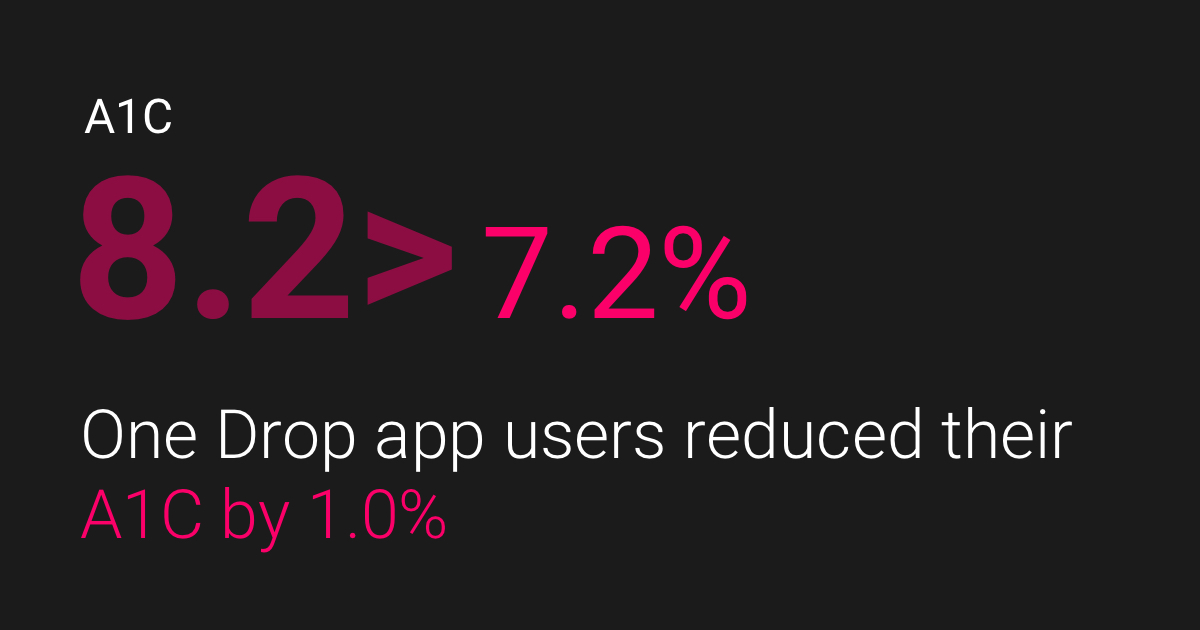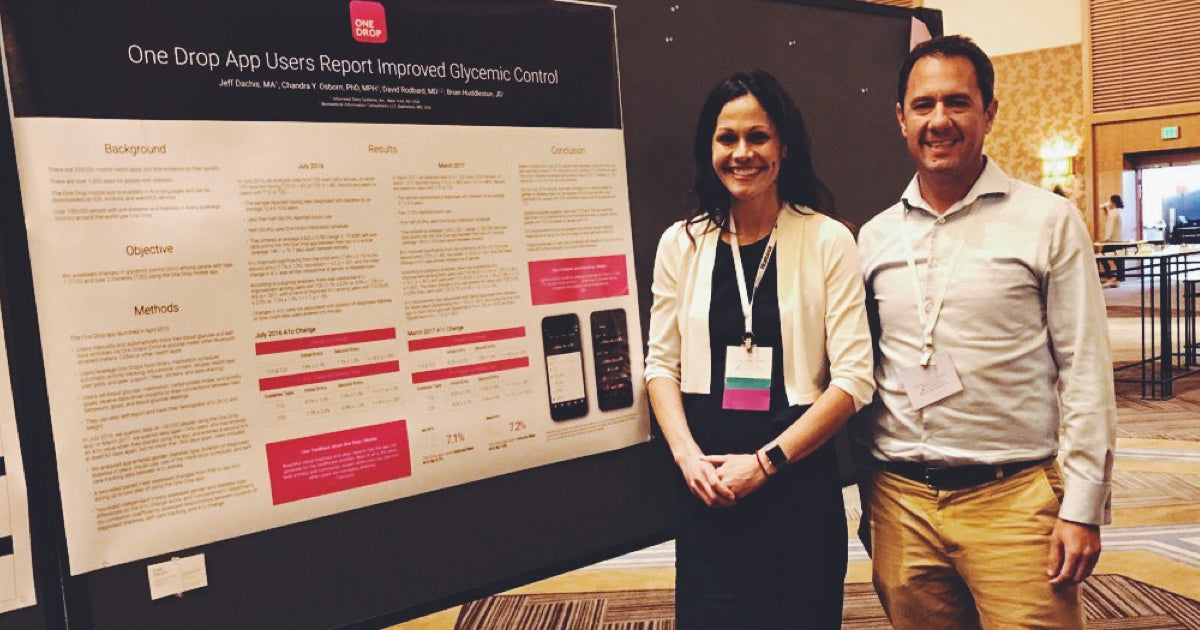Last week, I joined many of the top scientists in health behavior and behavioral medicine in San Diego for the Society of Behavioral Medicine (SBM) Annual meeting. I got to hear about the latest research on the relationship between behavior and health. Like most of the conferences that I go to, you learn a lot by going to the sessions, and you learn even more by watching and observing what's going on, both in and outside the sessions. I want to tell you about the five things that I took away from SBM this year.
1. Digital Health is the future, and the future is now: It was awesome to see how much work is being done to show how helpful digital health tools (like One Drop) are in helping people change their behavior and make healthier choices. Several years ago, we thought that digital health was the future, and this conference was proof that the future has arrived! It's really exciting to see how far we've come in just a couple of years and to think about where we'll be a couple years from now.
2. Health researchers can't work alone: If we really want to make a big impact, health researchers need to surround ourselves with people with different skills. I talked to a lady who told me she is developing some kind of health app. When I asked her who was developing the app, she said that she was writing the code herself. As she told me more, it was clear that, while her ideas were good, the app was not at all user-friendly. If we are going to do research that helps people, we need to work with people who can help us build the tools to do it well. As health researchers, we have a lot of knowledge and skills. There's also a lot of knowledge and skills that we need and don't have. In order to make the best 'product', we need to work closely with people who can help us do that.
3. Communication is key: The ways that researchers let other people know about the research that we're doing is changing - and this is a good thing. Not too long ago, the only way we let people know about what we learned in our research is by publishing the results in journals. Publishing in peer-reviewed journals is still really important because it keeps us honest in doing good research, but have you ever tried to read a journal article? It's not always easy. As health researchers, we need to talk about our research not only in journals, but also in places and ways the average person can understand it. We need to use tools like blogs and social media to tell people about the things we discover in ways that are simple and easy to understand.
4. We need a way to get research into the real world: There are lots of really smart people doing a lot of important research on how to improve health behaviors. The problem is, once the study is over, the information doesn't go anywhere. If we find something that works, it's really important that we find ways to make it available to the people who really need it, and that doesn't always happen. We need to find ways to make the things that we find work available to as many people as we can. Researchers need to think outside the academic box and partner with companies, non-profits and health care providers to make sure their great work is being used.
 5. One Drop works!: I've known about One Drop's research findings for a while now, so technically this isn't something that I learned at SBM. Our team presented research at SBM showing 1% improvement in self-reported A1c from a baseline of 8.2% in 1,372 people with both type 1 and type 2 diabetes using the One Drop Mobile app. We are going to be presenting a lot more exciting research in June at the American Diabetes Association Scientific Sessions. Stay tuned!
At SBM this year I was reminded that as a community, we're doing a great job at finding ways to help people change their behavior and be healthier, especially using digital tools. But we have a responsibility to do more than just good research. We need to work with others to make tools that are well designed and easy to use. We need to talk about our findings in ways that are simple and relatable. We need to make sure that our research doesn't just sit on a shelf, but is used in the real world.
I also was excited to discover that One Drop is leading the way in many of these areas - and I am excited to see what the future holds!
5. One Drop works!: I've known about One Drop's research findings for a while now, so technically this isn't something that I learned at SBM. Our team presented research at SBM showing 1% improvement in self-reported A1c from a baseline of 8.2% in 1,372 people with both type 1 and type 2 diabetes using the One Drop Mobile app. We are going to be presenting a lot more exciting research in June at the American Diabetes Association Scientific Sessions. Stay tuned!
At SBM this year I was reminded that as a community, we're doing a great job at finding ways to help people change their behavior and be healthier, especially using digital tools. But we have a responsibility to do more than just good research. We need to work with others to make tools that are well designed and easy to use. We need to talk about our findings in ways that are simple and relatable. We need to make sure that our research doesn't just sit on a shelf, but is used in the real world.
I also was excited to discover that One Drop is leading the way in many of these areas - and I am excited to see what the future holds!
 5. One Drop works!: I've known about One Drop's research findings for a while now, so technically this isn't something that I learned at SBM. Our team presented research at SBM showing 1% improvement in self-reported A1c from a baseline of 8.2% in 1,372 people with both type 1 and type 2 diabetes using the One Drop Mobile app. We are going to be presenting a lot more exciting research in June at the American Diabetes Association Scientific Sessions. Stay tuned!
At SBM this year I was reminded that as a community, we're doing a great job at finding ways to help people change their behavior and be healthier, especially using digital tools. But we have a responsibility to do more than just good research. We need to work with others to make tools that are well designed and easy to use. We need to talk about our findings in ways that are simple and relatable. We need to make sure that our research doesn't just sit on a shelf, but is used in the real world.
I also was excited to discover that One Drop is leading the way in many of these areas - and I am excited to see what the future holds!
5. One Drop works!: I've known about One Drop's research findings for a while now, so technically this isn't something that I learned at SBM. Our team presented research at SBM showing 1% improvement in self-reported A1c from a baseline of 8.2% in 1,372 people with both type 1 and type 2 diabetes using the One Drop Mobile app. We are going to be presenting a lot more exciting research in June at the American Diabetes Association Scientific Sessions. Stay tuned!
At SBM this year I was reminded that as a community, we're doing a great job at finding ways to help people change their behavior and be healthier, especially using digital tools. But we have a responsibility to do more than just good research. We need to work with others to make tools that are well designed and easy to use. We need to talk about our findings in ways that are simple and relatable. We need to make sure that our research doesn't just sit on a shelf, but is used in the real world.
I also was excited to discover that One Drop is leading the way in many of these areas - and I am excited to see what the future holds!




